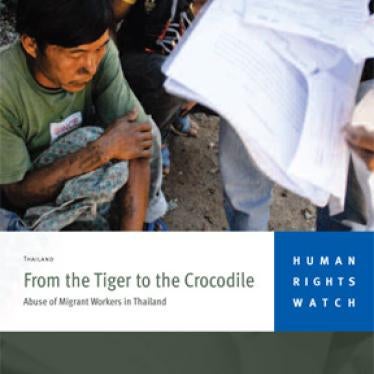BEATEN, burned, drowned, suffocated, sexually abused, trafficked, ripped-off, and always, eventually, rounded-up and pushed out - violence against migrants from Burma, Cambodia and Laos makes the headlines daily in the Thai media. But when the storyline turns to those responsible, a curtain of silence descends over the issue of those who perpetrate these abuses.
"From the Tiger to the Crocodile", a Human Rights Watch report released yesterday, finds migrants in Thailand facing a daily existence right out of a Thai proverb - fleeing the tiger, but running into the crocodile. Migrants have little recourse to justice, since the real-life embodiments of these proverbial predators often wear official uniforms.
Violence against migrants results from incidents as simple as failing to heed an order barked by police. A Burmese migrant who told Human Rights Watch about witnessing two Thai police officers kick a Burmese youth to death in broad daylight in Ranong said with resignation, "Many Burmese were watching but nobody went and helped because all of us were afraid - there is no security for Burmese people or myself."
Another Burmese migrant explained how two armed men shot her husband to death in front of her and then raped her in a rubber plantation in Phang Nga. Police failed to conduct a DNA test on the used condoms left behind, or follow up on a suspect named in a police report. Similar stories of violence and extortion emanate from Cambodians on the fishing piers in Trad, Lao girls in karaoke bars in the dusty lanes of Chong Mek in Ubon Rachathani, Shan families on the construction sites of Chiang Mai, and the Karen working in the garment factories of Mae Sot.
The lesson learned by migrants is to keep your head down and mouth shut - and always be ready to run fast when danger looms.
Last October, Thai Prime Minister Abhisit Vejjajiva declared that, "It is our government's policy to ensure that migrants can enjoy their freedom and social welfare in Thailand while their human rights are duly respected." One would then have expected a government that says it is committed to reform, understands why people from neighbouring countries flee to Thailand, and knows how badly migrants are exploited, would formulate policies that would assist migrants and attempt to address the underlying causes.
Instead, succumbing to the same kind of populist, anti-immigrant rhetoric seen in places like the United States and South Africa, the government is forcing migrants into a complicated and poorly explained "nationality verification" process that could lead to further abuses.
By March 1, all migrants in Thailand have to register or face deportation. A committee composed of top-level police and military personnel, set up on the order of Deputy Prime Minister Sanan Kachornprasart, is ready to lead the charge to enforce this decree. An estimated 800,000 Burmese, Lao and Cambodians who are afraid or do not know how to apply will become subject to deportation and thus even more vulnerable to violence, threats and extortion.
Not surprisingly, the vast majority are Burmese who are afraid to comply with the Burmese military government's requirement that they provide detailed information and return to Burma for scrutiny before receiving a so-called temporary passport. Jorge Bustamante, the UN Special Representative on the Rights of Migrants, recently condemned the potential push back, saying that "the threats of mass expulsion will result in unprecedented human suffering and will definitely breach fundamental human rights obligations."
He is right.
Migrant workers make huge contributions to Thailand's economy. A report by the International Labour Organisation in 2007 estimated that migrant workers may contribute as much as US$11 billion, or 6.2 per cent, of Thailand's GDP. Migrants do work that Thais don't want to do. Without them, parts of the economy could collapse. It's time that the Thai government offered them real protection from abuse and exploitation, commensurate with the role they play in supporting the economy.
To start, the Thai government should indefinitely suspend deportations connected to nationality verification. To address impunity, police involved in extorting, beating, and otherwise mistreating migrants should be dismissed from the police force and prosecuted in a court of law. The government should establish a special independent commission to investigate abuses against migrants. It should ensure the commission is fully empowered to subpoena witnesses, compel evidence, and make recommendations for criminal investigations in specific cases. More broadly, it should work with the UN Special Representative to make recommendations for changes in law and policies affecting migrants.
In response to the Human Rights Watch report, the government says that it has revoked provincial decrees put in place in 2006 and 2007 by the then military government in five provinces that severely restrict migrants' rights to use mobile phones, operate vehicles, and exercise basic rights to association, assembly and freedom of movement. This is welcome, and the government should publish the document revoking these decrees so that migrants can be reassured that these rights have been restored. To ensure that migrant workers can protect themselves from abusive employers, the government should do away with restrictions on migrants changing employers, and amend articles 88 and 100 of the Labour Relations Act of 1975 to permit migrants to establish and lead their own trade unions.
It is never too late to reassess government policy on any subject. Starting from a commitment to protecting rights, the Thai government can still reverse course and avoid a major human rights debacle, while setting a positive example for other countries in the region pursuing similarly dangerous populist programmes of targeting migrants.
It can also prove that the country is terrain suitable for all people, and show that in a modern society the vulnerable do not have to fear fierce animals.
Brad Adams is Asia Director at Human Rights Watch.






